Text
Ya Hoo! Some Mystical Moments with The “Sultan”
Mystical poetry is such an important and magnificent aspect of our Eastern literature that our culture and civilization remains incomplete and inferior without it. Sub-Continent especially Pakistan is the homeland of such great Sufi saints and mystics and their fame has spread all over the globe. Hazrat Sultan Bahoo (R.A) is one of such great personalities.
This outstanding and marvelous ‘Faqeer’ spent his whole life in the service of great mystics and taught the lessons of mysticism and sacred love of God to his disciples to become true lovers of Almighty Allah.
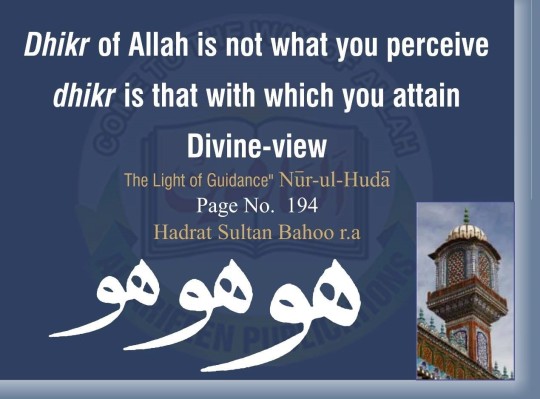
Diwan-e-Bahoo
Sultan Bahoo (R.A) has written more or less one hundred and forty books (140) and Diwan-e-Bahoo is one of them. There are fifty-one (51) odes in this collection. In his many books, you can find Persian versus focusing on the love of God and oneness. The following ode is the opening of his literary collection: -
I am certain within the universe there none worthy of worship besides Hoo
There is no existence or objective in both worlds besides Hoo
In hand with sword of negation comes alone without grief of hesitation
Depending on acquaintance other than the truth is no triumph besides Hoo
Negate all besides Allah and seek Allah from Allah
Keep your sight toward unison there is no purpose besides Hoo
He is first He is last manifests His splendor
Actual Divinity manifests from the truth there is none besides Hoo
Listen O friend of passion there is no trinity or duality
He is One He is the purpose none exists beside Hoo
He is Hoo He is truth I know none other than Hoo
He is Hoo He is truth I don’t recite none other than Hoo
I mention one I search one and one I keep in my heart like a flower
That one I find one besides that I find none other
I traversed entire universe I only liked that Truth (Haqq)
I called out one seen one and seen none other than one
I am consoler of myself nothing is in my hand besides Yahoo
I have attached my heart and soul with Hoo and not attached with none other besides Hoo
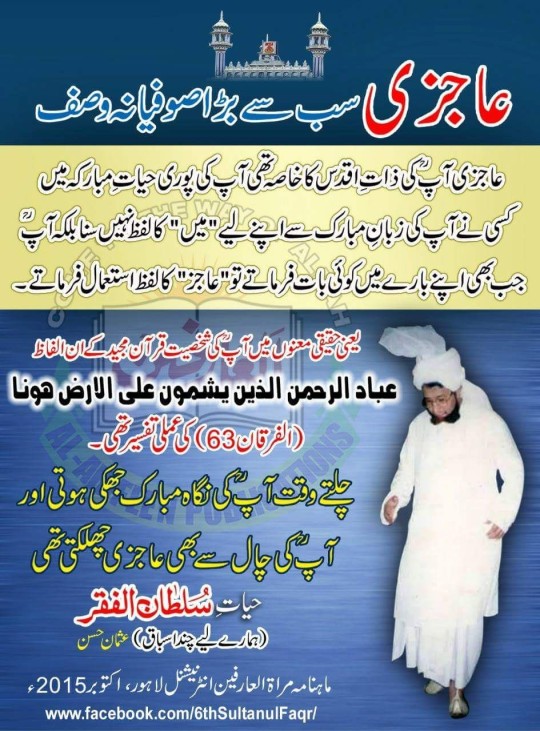
Now let us comment on these holy distiches taking them as an ode. His poetry is mystical according to structure and style and encompasses mystical secrets of sacred love of Allah. This becomes clearer and transparent when we comment on his work critically. As one critic explained, “His ode has broader meanings and insights with reference to structure and style. It does not mean the mere use of language and expression; these are critical and philosophical texture. Unless you consider the art of critique and aesthetic philosophy, you cannot understand the importance of his work’.
Hazrat Sultan Bahoo (R.A) has created a fabulous ode. Though rhymes have importance in the ode, yet a few bouts of rhymes are being overemphasized. But a deeper look can make you understand the focus of Hazrat Bahoo (R.A) and his wisdom and one forgets the use of a few rhymes. This wisdom appears in the use of the words “IllahHoo’ and ‘Hoo Hoo’. These words are fitted into the beautiful ode in such a delicate and charming manner that the listener gets lost in spiritual touch and gets isolated from the world. This special feature of Hazrat Bahoo (R.A) can be found in many other distiches. Just have a look at the following distiches: -
You don’t mention I am but say that it is He
Yes, it is He it is He Only He
None knows the secret of this inhalation
It is only He no one is aware of this proclamation
No one knows the passion of my heart what effort I can make
Why have you distanced me alas so sad so sad?
This expression can be better termed as linguistic excellence. This is the same work done by great poet Jilal-ud-Din Muhammad Balkhi in ‘Kulyat-e Shams’. Read carefully the following distiches: -
Come back a hear melody yer le yele yer le yele from my inner
I am mentioning every moment tan tanan yer le yele yer le yele
O cupbearer, bring that goblet and sing in the sound of flute
Then say Tala lala tala lala yer le yele yer le yele absolute
Due to absorption every lament sound
Qu Qu beQuqu beq beququ beq beququ
I am slave of Shams ul Haq Tabrizi who had taken this immaterial thing to hight
Shaqa Shaqaqa Shaq Shaqaqa Shaq Shaqaqiqi
Such distiches are called distiches of emotions because here rhymes and traditional style of expression is not given importance. Here the poet talks about his inner spiritual feeling of love and devotion. He is not concerned about form and structure; it is an all useless effort. Distiches of Hazrat Sultan Bahoo (R.A) are cultivated with truth and common understanding; they do not contain the fantasy of love and beauty. Sometimes, mystical passion reaches the highest level and aesthetic form of the ode is challenged. His distiches revolve around faith and oneness and artificial aesthetic sense is often ignored because faith is his life. As the distiches of Hazrat Sultan Bahoo (R.A) reveal, he seems to follow the tradition and style of two famous poets, namely, Hazrat Mevlana Jamal-ud-Din Muhammad Balkhi (R.A) and Khawaja Shams-ud-Din Muhammad Hafiz Sherazi (R.A).
If a person had studied ‘Kulyat-e-Shams’, he would have easily inferred that Diwan-e-Bahoo’ has similarities in several distiches with that of Hazrat Mevlana in terms of rhymes and alteration. As we have already explained, Hazrat Mevlana is the originator of such style. Similarly, the style of Hafiz Sherazi can also be found in several odes of Hazrat Sultan Bahoo (R.A).
#Sarwari qadri order#Mahnama Mirrat ul Arifeen international#Hazrat Sultan Muhammad Asghar Ali#sultan bahoo horses#sultan bahu karamat#sultan bahoo picture
0 notes
Text
HADHRAT SULTAN BAHOO BOOKS
Presently, Hadhrat Sultan Bahoo’s one book in the Laanh’dee language (origin of Punjabi, Seraiki and Hindko languages) and thirty books in the Persian language are available, whereas, according to popular tradition, he authored around one hundred and forty books.

Abyat (The Sufi Poems of Hazrat Sultan Bahoo) are considered a master piece amongst the seekers of Sufi teachings, written originally in Saraiki/Punjabi poetry in which important teachings for ardent lover of Allah are addressed in most eloquent manner. The reality of soul and spirit is described for the people seeking Sufi path and spiritual satisfaction of the inner most. This is the only piece of writing which is in Saraiki/Punjabi, all other literature of Hazrat Sultan Bahoo was originally written in Persian. All of Hazrat Sultan Bahoo's Abyat are available on this site in the Abyat sction.
To read more about the missing books, please read Sahibzada Sultan Ahmad Ali's Article Quest for Non-Available Books of Hadrat Sultan Bahoo (R.A.)
Following are the 31 books available today:
1. Asrar-ul-Qadri
2. Ameer-ul-Kawnain
3. Awrang Shahi
4. Tawfeeq-ul-Hidayat
5. Taigh-e-Barehna
6. Jam’e-ul-Asrar
7. Hujjat-ul-Asrar
8. Didar Bakhsh
9. Diwan-e-Bahoo
10. Risaala Ruhi
11. Sultan-ul-Wahm
12. Shams-ul-Aarifeen
13. Aql-e-Baidar
14. Ain-ul-Aarifeen
15. Ain-ul-Faqr
16. Fadhl-ul-Liqaa (Khurd)
17. Fadhl-il-Liqaa (Kalaan)
18. Qurb-e-Didar
19. Kashf-ul-Asrar
20. Kalid-ut-Tawhid (Khurd)
21. Kalid-ut-Tawhid (Kalaan)
22. Kalid-e-Jannat
23. Ganj-ul-Asrar
24. Majaalis-un-Nabi (SAWW)
25. Mohabbat-ul-Asrar
26. Mohkam-ul-Fuqaraa
27. Mahak-ul-Faqr (Khurd)
28. Mahak-ul-Faqr (Kalaan)
29. Miftah-ul-Aarifeen
30. Nur-ul-Huda (Khurd)
31. Nur-ul-Huda (Kalaan)
From the above, the following have been added on this site in the Books section:
1. Ain-ul-Faqr
2. Kalid-ut-Tawhid (Kalaan)
3. Nur-ul-Huda (Kalaan)
4. Shams-ul-Aarifeen
5. Aql-e-Baidar
6. Mahak-ul-Faqr (Kalaan)
7. Asrar-ul-Qadri
#sultan bahoo urs#sultan bahoo darbar Spiritual#Tasawwuf#sufi islam#Al Arifeen Publications#Heart Deeper Than Ocean#rohaniyat o amliyat
0 notes
Text
World Peace: Teachings of Hadrat Sultan Bahoo (RA)
Reciting the Islamic creed of oneness is the first provision to enter Islam. This Islamic creed of oneness is not just a bunch of words but it is the whole philosophy of religious and worldly life and in a way, it is the commitment and declaration that one makes to one’s Lord. If we just understand the interpretation of Islamic creed, one gets oneself free from all kinds of obscenities. Negating all other concepts and accepting and admitting the true reality of Allah Almighty and prophecy of Hadrat Muhammad (S.A.W) is the only and everlasting reality. And then Allah Almighty has asked to acknowledge this, not just by tongue but also authenticate from the heart. It is a kind of declaration which a person makes with his Lord and Prophet (SAW) to act upon all the commandments and stay loyal to them.
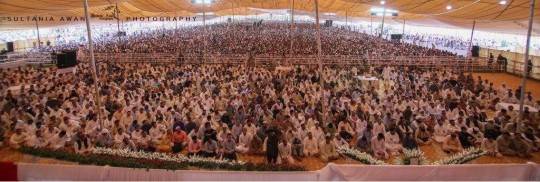
Now come to the verses of Surah AlFatiah; one accepts Allah’s eminence and that He is the Creator of the universe. Having faith on the Day of Judgment and accepting Him as one’s Lord, one seeks true path from Him, the path that will lead one to success in this world and hereafter, and seeks protection from the misguided people, who will face the curse of Allah. These are all basic principles of faith. Then one is honored to speak with Allah when Allah Almighty tells one that this Holy book of Quran is a guidance for righteous people. This is the real difference. Just reciting the Islamic creed makes you Muslim, but not the r virtuous one. Virtue (taqwa) is the first step for guidance. It means that virtue is the basic principle to accept the oneness of Allah Almighty and having unfaltering faith in Him. This is how one gets guidance from Allah. When one sacrifices all one’s desires for Allah Almighty and Prophet Hadrat Muhammad (S.A.W), the journey to become upright starts and the process of edification begins. This way of guidance makes a person faithful believer (momin) and by acting upon the commandment of Allah and Prophet Hadrat Muhammad (S.A.W), the path of divine love starts which is asked by Almighty (as narrated in Quran several times) that love Allah and His Prophet (S.A.W) so that His mercy is showered. This is the true demand of Creator i.e. to be loved. When one considers Allah and his prophet as one’s beloved, he tries to avoid those things which they dislike. Who wants to hurt his beloved? Every lover seeks and tries to get closeness and proximity of his beloved.
Sufis taught us the way and path of ardent love with Allah and His beloved prophet. They showed us the path, by following which; one will surrender one’s own will to the will of Allah Almighty and attain the lover’s happiness.
Hadrat Sultan Bahoo (RA) has explained this ardent love of Divine many times in his books i.e. one can neither become virtuous by just calling oneself a Muslim and offering the prayers neither can attain contentment of Allah.
· The body of yours is the dwelling of true Sustainer O mystic glance in your inner self Hoo
· Don’t beg Khidr the water of immortality is within your inner self Hoo
· Kindle the lamp of passion in the darkness perhaps swiftly you might find shine Hoo
· Dying, before death ‘Bahoo’ then recognized the true sign of Divine Hoo
In the above quartet, Hadrat Sultan Bahoo (RA) is asking to dwell one within one’s self. Merely everyone says that Allah is nearer than the juggler vein and, He stays in the heart but, has anyone imagined the state of his heart; is it worthy to be a habitat of Allah? Allah is sacerdotal and Noor. It is absolutely important that our heart should be free from all indecencies, evils, jealousy, and temptations to make it apt to be the habitat of Allah. Hadrat Sultan Bahoo (RA) has asked to kindle the lamp of passion and hold the ardent love of Divine, so that one’s lost chattel (matta) becomes the inhabitant of one’s heart. Only a spiritual mentor (Murshid-e-Kamil) shows this path to find the lost chattel. Hadrat Sultan Bahoo says:
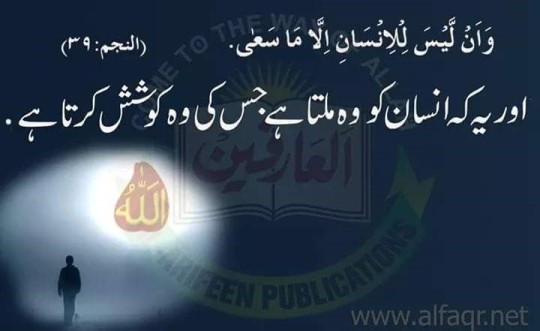
· With education, scholars become arrogant and Hafiz fills with pride kit Hoo
· Helpless roam around streets with books under their armpit Hoo
· Where they see delicious food prolonged sermon, they submit Hoo
· Deprived in both worlds, ‘Bahoo’ are those who sold earnings remit Hoo
Vainglory is attributed to Allah only. Service and humbleness is suitable for a human being. When someone becomes arrogant due to one’s education, power or beauty, this is where one gets misguided from the path of Allah and Prophet Hadrat Muhammad (S.A.W) which is the beginning of hostility. The desire erupts to subordinate others based on knowledge, power and wealth. The people of Makkah had this same arrogance of belonging to supreme families, race and centuries old faith which not only made them deny prophecy of Prophet Hadrat Muhammad (S.A.W) but it also provoked cruelty against him (SAW). But the people who were destined for guidance, became friends of Allah Almighty and cruel became the fuel of hell.
#Ain ul Faqr#Hadhrat Sultan Bahoo social views#Hadrat Sultan Bahoo’s period#Bridal Symbolism in Sultan Bahu’s Poetry#Hadrat Sultan Bahoo's Persian Poetry#Sufi poetry#Sultan Bahoo Poetry#Mystical Moments#Hadrat Sultan Bahoo (R.A.) Proposed Human Society#Sultan Haq Bahoo In This Modern Age#Role of Hazrat Sultan Bahoo
0 notes
Text
Views of Hadrat Sultan Bahoo on Moral Development in Social Perspectives
Hadrat Sultan Bahoo was gifted by GOD, with full of intellectual and spiritual enlightenment. Hadrat Sultan Bahoo did not have any primary education as he spent his all-time in attaining spiritual experience and Divine truth. Sultan, Bahoo said: “Though I haven’t received any formal education after receiving Divine knowledge, I have become pure, that’s why the complete knowledge manifests in my heart through reflection”. Sultan Bahoo expressed his opinion in every section of human nature. Sultan Bahoo’s basic preamble was to highlight spiritually, but at the same time, he also expresses his views on philosophy and social sciences.

Hadrat Sultan Bahoo (RA) wrote about a hundred and forty books and in all these books, Sultan Bahoo advised three things with repeatedly. These areas under.
· Obscurity
· Desisting
· 3.To act upon the Shariah of the Prophet Muhammad (PBUH)
He exhorted the pursuer of Truth four fundamentals and insisted that one should devote oneself to them to attain Truth. These practices involve.
· Visualization of the image of Allah’s name (ALLAH).
· Visualization of the image of the Holy Prophet’s name (MUHAMMAD).
· Zikar of Kalma Tayyaba
· Remembrance of death and grave
Moral development in the light of the Holy Quran, Hadith, and Kalam-e-Bahoo
Sultan Bahoo is considered one of the greatest Sufi in the Indo-Pak Sub Continent belonging to Qadri Order he had determined the moral development in objectives of education in his poetry. We can easily dram the conclusion from the Kalam of Sultan Bahoo that “education is such a thing which enlightens the human conscience and makes him the upholder of truth. Education taught mannerism and makes its seekers aware of principles of life under the teachings of Islam. It is the learners in these words. “Oh intelligent soul, if you are in your senses then use your knowledge only for nobility, righteousness, and nearness to God” Translated from, Quran-E-Deedar, Page No. 124. Similarly, he says in his book Qurb-E-Deedar, “The Purpose of education is to attain nearness to God and enlighten the human conscience. Those who get knowledge for worldly fame, they are without conscience”.

Allah Almighty says that in the Quran: 27-Alzariat-56:” And that I have created Jinn and human for the sake of my worship”.
Even the Holy Prophet (PBUH) says “He who got the knowledge to earn wealth he is infidel, he who got the knowledge to cavil (taunt, objection) he is a hypocrite and him who got the knowledge to get happiness and pleasure of God he is a Muslim”.
Sultan Bahoo regards hearth of the “Momin” and says
(Oh! Seeker! Your body is the housed Allah if you see inside, you don’t need to ask Hadrat Khizar for the water of aliveness you have a spring of the water of aliveness inside your”).
According to Sultan Bahoo, a student should possess six qualities.1. Faith 2. Self-belief. 3.Honesty. 4.Truthfulness 5. Desire 6. Love. (Kaleed-Al- Tauheed, page-891). In these qualities, he had more emphasized on morality. He says that the development of morality in the students interlinked with the practical life of the teacher. If a teacher’s sayings are not by his actions then he is not in a position to enhance morality in his students. According to Sultan Bahoo, morality is the basic element for the successfulness of teaching and learning. The contents of education in the Sufi system of education were for enlightening human conscience and makes him upholder of truth about mannerism and character building. Sultan Bahoo says,
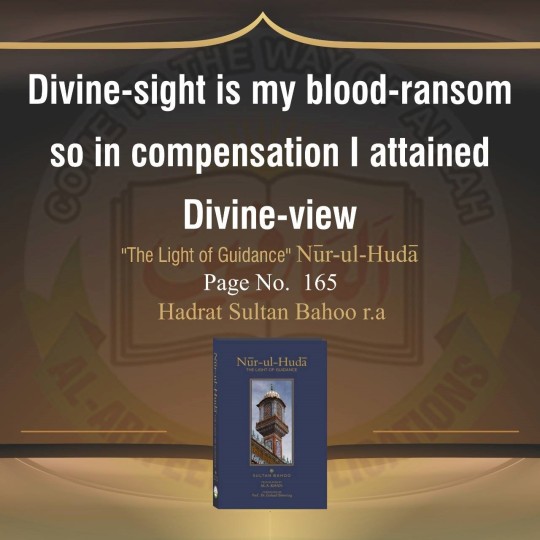
By rolling beads heart is not awakened what use is holding beads Hoo?
Acquired knowledge without respect what is gained from such knowledge’s seeds Hoo
Remaining in solitude nothing is achieved what is the point of solitudes you complete Hoo
Milk will not set without a setting agent (Jaag) ‘Bahoo’ even to red if you heat Hoo.
He clearly said the content of education must foster the practical activities this is also in accordance with the actual spirit of Islam. The process of teaching and learning in Islamic perspectives is to train the next generation to develop morals and noble qualities along with professional development. The Sufi system of education was following Islam.
“In an Islamic system of education, the role of the teacher is three-fold,
(a) To prepare and motivate the pupil to be clean and receptive in intention and attention.
(b) To impart knowledge of the ‘Book’ (the text, the subject matter).
(c) And to enable the learner to comprehend the meaning, purpose and the wisdom to the knowledge
so acquired.
The Quran has underlined these three main aspects of the role of the Prophet (PBUH) as a teacher (Wa yuzakkeehim was yu’allimhum al-Kitab was al-hikmah)” (Surah Al-Jummah, Verse 2): “God is who has sent to the unlettered Arab community a Messenger from their midst to relate and recite to them. His revelations and to impart sanctity to their quality and their actions, to teach them the Quran and impart to them the knowledge of its authoritative text to teach them the wisdom of judging rightly in matters, relating to life and conduct and to be in full accordance with fact, reason and good sense, and to teach them sound judgment in the choice of means and ends notwithstanding that they were before an ignorant adherent of evidently false beliefs”.
#Sultan ul Faqr#Sufism#Sultan ul Arifeen#Hazrat Sultan Bahoo#Teachings of Hazrat Sultan Bahoo#asrar-ul-qadri#shams-ul-aarifeen
0 notes
Text
Unity of Muslim Ummah & Teachings of Hadrat Sultan Bahoo
Unanimous the faith of every Muslim on One Allah, His Messenger (Muhammad PBUH) as the last prophet, the Holy Quran and Sunnah/Hadith of Prophet became a binding force bringing together people of the different region as one Ummah. However, the anti-Islamic force couldn’t swallow this growing religion and unity among them considering it as a major threat towards their ideologies and religions. Muslim history is replete with glory and downfall, having difference as a healthy and creative activity, however, there was no question on differences on religious matters as are prevailing today. Instead of becoming enemies of each other they were respectful and courteous with each other but very stern for adversaries. During the period of Banu Uma-i-yah and Banu Abbas, there had been many attempts to disintegrate and disunite Muslims. Many sects grew and died. For example, Khawarij and Rawafidh were born during that time. Excellent and very sincere work of true scholars of Islam the Ummah rejected the beliefs of Khawarij, Rawafidh, and their sub-sects and Muslims remained united. In 1022, Al-Hakim Bin-Amr Allah with, the support of non-Muslims created new Mazhab(religion) called Daruzism. During early 1900 in Iran when Bahá'u'lláh claimed that God has manifested in him and founded the religion of Bahaism. Both of the above breaks from the Muslim community were not considered as major disunity among Muslims because both the followers of Druzism and Bahaism did not claim themselves as Muslims any more. One of the most recent attempts by the anti-Islam forces to disunite Muslims was the establishment of another religion within the Muslim community called Ahmedism or Qadyanism. In the meantime, tussle started between Shia and Sunni also thus creating animosity between them.
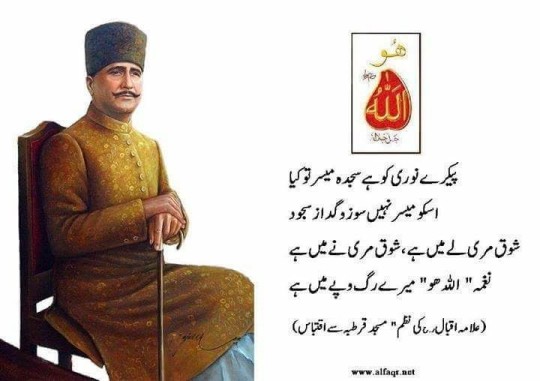
The intellectual difference of opinion always remained among the scholars of Islam but that should not be considered as a division. For the last 13 centuries, Muslims have dominated the entire world in every field ranging from Human rights, tolerance, equality, justice, military tactics/Strategy, Science/Technology, Laws for the state, health, and education. Khilafat-e-Uthmania (Ottoman Empire) was a thorn in the eyes of anti-Islam forces. They wanted to destroy this Islamic Empire at any cost. They were trying for the last 13 centuries to destroy it but did not succeed. These forces saw the shift in focus of Muslim scholars and took full advantage of it. They planted a very dangerous seed of nationalism among Muslims. Muslims started fighting against their own Muslim brothers because of either they were not from the same region or they were speaking a different language. When the Muslim superpower, Ottoman empire (Caliphate-of-Uthmania) was fighting against the European colonial powers, the English, the Dutch, the French, the Italians, etc, at the same time they had to defend themselves from their own Muslim brothers because Ottoman forces were TURKS and were not local. To create HATE for TURKS the local so-called scholars of Islam used religion in order to get support from all local Muslims. The tactics they used to get support from local Muslims in order to destroy Caliphate was simple. Keep Muslims busy in fighting on minor issues. Make small issues as big issues and fight against those Muslims who do not accept the ideology of these local nationalist scholars. Since these nationalist scholars of Islam were fighting against Muslim Turkish Ottoman Empire the Western Christian governments loved them and supported them in their struggle. Now, these Muslims were very friendly with Kuffaar and very hard on other Muslims. After a long series of events during 1800 and early 1900, most of the Muslims countries became colonies of European governments. These so-called nationalist scholars received big rewards from their Lords in the West and they were successful in destroying the unity of Muslim Ummah while still claiming the title of "Islamic Scholars".
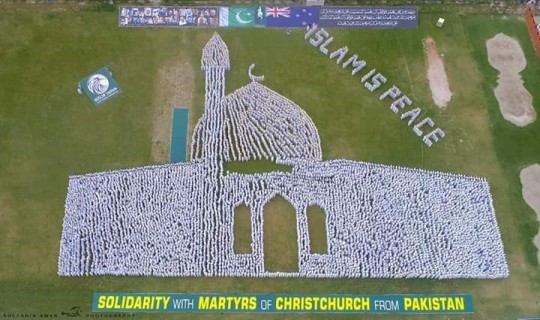
Present Era Challenges
Probably, there are no other people in the world today who have been as divided as Muslims. They are divided along religious, political, ethnic, cultural, racial, linguistic, and sectarian lines. Muslims all over the world are facing brutality, hatred, and image of Islam is being portrayed as nontolerant and highly uncivilized. Whereas, tolerance, basic rights of man kinds, justice and equality was outlined by our Holy Prophet. These divisions extend further into subdivisions. Status, wealth, fame, and fortune have also created social differences among Muslims. Muslims are divided at the root into Sunnis and Shias. Sunnis are further divided into Hanafi, Maliki, Shanghai, and Hambali. Shias too are divided into Kesania, Zaidia, Imamia or Ithna ‘Ashari, Ismalia, etc. Sunnis are also divided into Ahle-hadith and Ahle-fight. In the Indian subcontinent (at least) Ahle-fiqh are further divided into Deobandis and Barelwis. Similar differences exist in other places as well. Are all these divisions and differences schools of thought as many Muslims claim? Whether or not we admit it, these differences and divisions do create physical, emotional, and psychological barriers amongst us. Muslims have left basic teachings of Islam and fall prey to the nefarious designs of enemies of Islam. Hadrat Sultan Bahoo Says: Na Main Sunni na main Shia Mera duhan to dil sariya Hoo (Neither I am Shia nor Sunni and I am fed up from both of them)
Teachings of Hadrat Sultan Bahoo:
Hadrat Sultan Bahoo has written 140 books, which are logically developed having its base on verses of Holy Quran and Hadith. These books are complete code in its essence and do not focus on only one subject matter as these are almost translation and description of Holy Quran. During research work on these Great Books we find all subjects have been covered consciously. Hadrat Sultan Bahoo has covered the unity of Ummah in his poetry vis-à-vis his other descriptive writings. He gave the lesson of love for the entire mankind, what to talk of Muslims or only one sect of Muslim only. Muslims of different sects and people of different religions including Hindus and Sikhs got benefitted from His teachings (FAIZ). So many non-Muslims embraced Islam due to truthfulness and reality of his message and his preaching are far away from Hippocratic approaches or any greed (which is presently evident in so many so-called Scholars of the present era). He mostly writes “Allah Buss Ma Siwa Allah Hawas” (Allah is enough and rests everything is greed). Allah says in the Holy Quran, the one who relied on Allah, Allah is enough for him (Verse 3 Tallaq, Chapter 28).
#Sultan Bahoo Books#Sultan bahoo history#Sultan Bahoo Parents#Nur-ul-huda#Kalid-ut-tawhid#aql-e-baidar#mahak-ul-faqr
0 notes
Text
Hadrat Sultan Bahoo (R.A.) Proposed Human Society
Hadrat Sultan Bahoo (May Allah Bless his Soul) fought against social and ethical evils and challenges of his era with his pen by writing about 140 books. In today’s society when the world has been transformed into a global village, humanity still faces similar kind of issues. In this paper, it is argued that guiding principles of Hadrat Sultan Bahoo (R.A) philosophy for human society stand on purification and reformation of individual on which the society of peace and love for humanity can be built. Union with Almighty by adopting Sufism, with the true spirit of the Holy Quran and Sunnah, and negating the desires of base self is the foundation for the purity of the individual. In current time, human savagery has reached alarming levels and intolerance has shaken very foundations of our social and religious values. In such circumstances, purity of heart and tolerance are the main cure by rejecting extreme rigidity of sectarian, ethnic, linguistic or other such divisions.
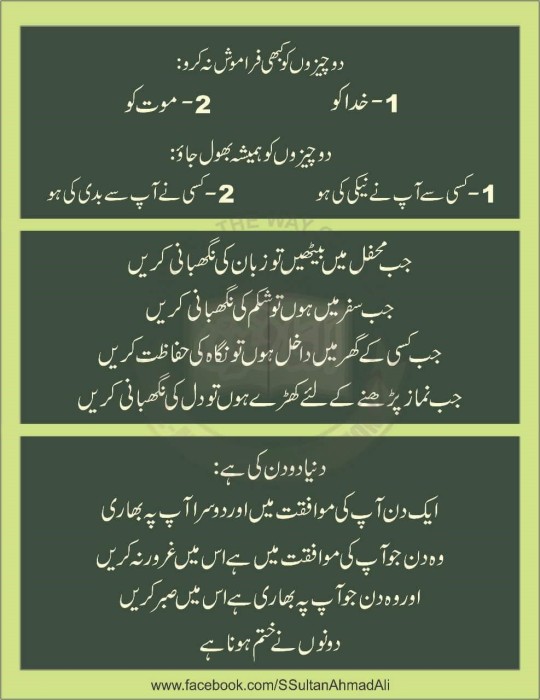
Discrimination among humans is the biggest obstacle for a just and peaceful society and according to the law of Allah (God), no one can discriminate anyone, which is the principle of Faqr (spiritual excellence) adopted by Faqir. Human society has to follow divine values otherwise, in the words of Bahoo, we will lose not only this world but the next world too. Tolerance, basic rights of human society, justice and equality were outlined by our Holy Prophet (Blessings and Salutations Be Upon Him) in the first place. Hadrat Sultan Bahoo has emphasized to have practical life instead of monasticism. The Muslim Ummah needs unity of hearts and belief rather than that of race or territory. All human beings are taken as equal members of the world/society. The Muslims have been instructed to act justly for every creature of the world what to speak of humanity alone.
Sultan-ul-Arifeen Hadrat Sakhi Sultan Bahoo(May Allah Bless his Soul) belonged to the age of seventeenth-century when social & ethical evils were prevailing and the condition of society than and now have disturbing similarities. In the Muslim world, communities and society both were in distress. In the global village perspective, the whole world has transformed into one Society (McLuhan, 1962). The term ‘Ummah’/millah, is interpreted as “Muslim Community”, living all over the world, without distinction, not confined to any particular region or nationalism. In the Holy Qurãn ‘Ummah’ is repeated 64 times for a people to whom a Prophet was bestowed by Allah (SWT). Hadrat Sultan Bahoo (May Allah Bless his Soul) fought against the societal ills with his pen. He thus raised slogans of following the teachings of Muhammad (صلی اللہ علیہ وآلہ وسلم Blessings and Salutations Be Upon Him), rejecting extreme rigidity of sectarianism as practiced by so-called theologians and misguided mystics (Sufis).

He was even not pleased with what the followers of ‘Imams’ said and did, as he has tested them on the touchstone of the Qurãn and the Hadith, constituting the basic principles of Islamic Society. A close study of the authorship of the Great Wali-Allah, Hadrat Sultan-ul-Arefeenرح (May Allah Bless his Soul) addresses the well-being of all mankind fully believing in Allah (SWT) as رب العالمین “Lord of the Worlds”. The Holy Qurãn nowhere particularizes Allah (SWT) with Muslims only, so is the case with the last and the Holy Chief of Prophets, Syed-ul-Ambiya Mohammad-e-Mustafa (صلی اللہ علیہ وآلہ وسلم Blessings and Salutations Be Upon Him) sent to humanity as defined in the Holy Qurãn وَمَا أَرْسَلْنَاكَ إِلَّا رَحْمَةً لِّلْعَالَمِينَ ("And We (Allah) have not sent thee (Muhammad) but as a mercy for both the worlds.", (Al-Quran 21:107) and therefore the love and teachings of Holiest Prophet (صلی اللہ علیہ وآلہ وسلم Blessings and Salutations Be Upon Him) is the fundamental principle of a just Islamic Society embedded in وحدانیت (Unity of Allah) and omnipotence of Allah (SWT) culminating into love for humanity irrespective of caste, creed, and religion. Hadrat Sultan Bahooرح (May Allah Bless his soul) has a strong belief that by recognizing self, human recognizes Allah (God) من عرف نفسہٗ فقدعرف ربہٗ and individuals.
In his proposed human society must have the following human values inculcated:
Hundred thousand sacrifice upon those Sufis who don’t utter awful thing Hoo.1 (Bahoo, 2010, p. 48)
Do not accompany treacherously and with slandering everyone you do not treat Hoo. (Bahoo, 2010, p. 71)
Your life is a few days establish worshiping or you will be regretful but Hoo. (Bahoo, 2010, p. 63)
The true path is of Mohammed ‘Bahoo’ upon which God is to achieve Hoo. (Bahoo, 2010, p. 16)
The article is based on these guiding values of Hadrat Sultan Bahooرح (May Allah Bless his Soul) for his proposed human society. “A society is a kind of a community (or a part of the community) whose members have become socially conscious of their mode of life, and are united by a common set of aims and values” (Ottaway, 1970, p. 3). Hadrat Sultan Bahooرح (May Allah Bless his Soul) as an author has stressed that members of a society should never disparate or should not make ill-mannered people as their friends which destroy the prestige of the whole family and advised to recoil the society on the basis of universal dignity, equality and equity, security, and justice on Earth according to the will of Allah (SWT), encompassing all human regardless of their ethnic origin assuring unity of the human family, fostering acquaintance among people and activating the divine values. Being a man of exceptional intellect and values embedded in Islamic society, a pluralistic one Hadrat Sultan Bahooرح, fought with his pen for an ideal society, as he was born to pious parents and linage.

Ancestors of Hadrat Sultan Bahooرح (May Allah Bless his Soul) migrated to this part of the world (Soon Valley) from Arabia after the death of Hadrat Imam Hassan and Hadrat Imam Hussain (May Allah Bless their Souls). Having fought and defeated the Hindus of Pind Dadan Khan and the districts around them, preached them to enter Islam by their virtues. The father of Hadrat Bahooرح [Bazidرح (ascendant of Prophet Mohammad (صلی اللہ علیہ وآلہ و سلم Blessings and Salutations Be Upon Him) belonged to the Awan tribe], was a Hafiz-ul-Qurãn and a distinguished scholar of his time, migrated to Jhang district.
He was a person of quiet disposition and so was his spouse, the mother of Hadrat Bahooرح (Hadrat Bibi Rasti R.A). His family was held in great regard by the Emperor Shah Jahan who conferred on his father, Sultan Bazidرح, Kahar Janan in jagir. Hadrat Sultan Bahooرح (May Allah Bless his soul) was born in 1629 AD (1039 Hijri). Legends relating to his childhood are numerous and of a varied nature. One of them is so interesting that we cannot help relating it here. It runs thus: When Hadrat Bahooرح was a boy, he was such a devout Mussulman that a sort of radiance spread around his face, and whenever a Hindu witnessed it, he was so impressed by it, that forgetting all, he renounced his religion and became a Mussulman. This miracle wrought exclusively by his radiance frightened the Hindus, who sent a delegation to wait upon his father and request him to keep his son Bahooرح indoors, except certain hours. Thus request was complied with, and the young boy thereafter had to remain indoors (Krishna, 1938, p. 49). Witnessing that Heرح was a kind of force, which changes the minds of humanity to the righteousness, brotherhood, tranquility, peace, and course of history and society. To these causes, he contributed 140 books in Persian and Punjabi, which for the most part have been out of the reach of the general public and humanity. Acknowledging efforts of (besides many others), to the International Tanzeem-ul-Arifeen and its founder Hadrat Sultan Muhammad Asghar Ali Sarwari Qadriرح (may Allah bless his soul) who took the initiative to get the books collected and print them with translation for the Urdu knowing people. However, in English, there were not many translations. Praise to the ‘Sahibzadagan’ of Hadrat Sultan Muhammad Asghar Aliرح (14.8.1947 - 26.12.2003) namely; Hadrat Sultan Mohammad Ali, Sultan Ahmad Ali and Sultan Bahdar Aziz, who despite many difficulties continued the efforts of their great father and ancestors and along with maintaining the International Tanzeem-ul-Arifeen established an Institute ‘Mission of Unity, Stability, and Leadership In Muslims (MUSLIM)’ with the aim to promote research and dialogue in the Muslim World for addressing its concerns and finding practical solutions to the problems.
#Ain ul Faqr#Hadhrat Sultan Bahoo social views#Hadrat Sultan Bahoo’s period#Bridal Symbolism in Sultan Bahu’s Poetry#Hadrat Sultan Bahoo's Persian Poetry#Sufi poetry#Sultan Bahoo Poetry#Mystical Moments#Hadrat Sultan Bahoo (R.A.) Proposed Human Society#Sultan Haq Bahoo In This Modern Age#Role of Hazrat Sultan Bahoo
0 notes
Text
Hadrat Sultan Bahoo (R.A.) Proposed Human Society
Hadrat Sultan Bahoo (May Allah Bless his Soul) fought against social and ethical evils and challenges of his era with his pen by writing about 140 books. In today’s society when the world has been transformed into a global village, humanity still faces similar kind of issues. In this paper, it is argued that guiding principles of Hadrat Sultan Bahoo’s philosophy for human society stand on purification and reformation of individual on which the society of peace and love for humanity can be built. Union with Almighty by adopting Sufism, with the true spirit of the Holy Quran and Sunnah, and negating the desires of base self is the foundation for the purity of the individual. In current time, human savagery has reached alarming levels and intolerance has shaken very foundations of our social and religious values. In such circumstances, purity of heart and tolerance are the main cure by rejecting extreme rigidity of sectarian, ethnic, linguistic or other such divisions. Discrimination among humans is the biggest obstacle for a just and peaceful society and according to the law of Allah (God), no one can discriminate anyone, which is the principle of Faqr (spiritual excellence) adopted by Faqeer. Human society has to follow divine values otherwise, in the words of Sultan Bahoo, we will lose not only this world but the next world too. Tolerance, basic rights of human society, justice and equality were outlined by our Holy Prophet (Blessings and Salutations Be Upon Him) in the first place. Hadrat Sultan Bahoo has emphasized to have practical life instead of monasticism. The Muslim Ummah needs unity of hearts and belief rather than that of race or territory. All human beings are taken as equal members of the world/society. The Muslims have been instructed to act justly for every creature of the world what to speak of humanity alone.
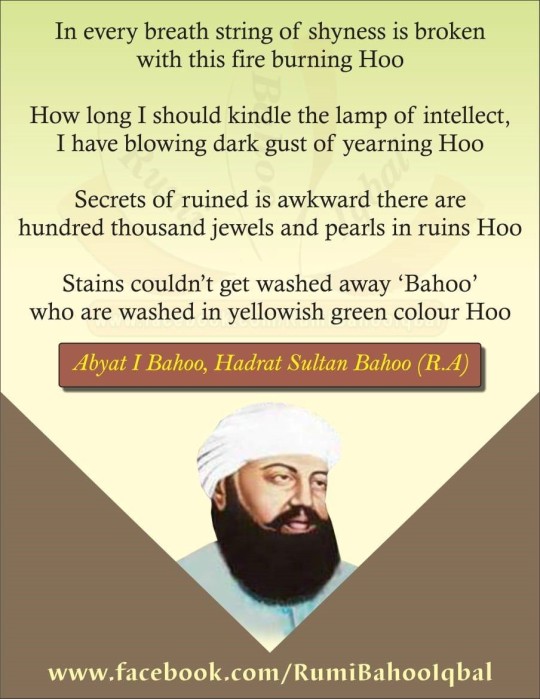
Sultan-ul-Arifeen Hadrat Sakhi Sultan Bahoo (May Allah Bless his Soul) belonged to the age of seventeenth century when social & ethical evils were prevailing and the condition of society then and now have disturbing similarities. In the Muslim world, communities and society both were in distress. In the global village perspective, the whole world has transformed as one Society (McLuhan, 1962). The term ‘Ummah’/millah, is interpreted as “Muslim Community”, living all over the world, without distinction, not confined to any particular region or nationalism. In the Holy Qurãn ‘Ummah’ is repeated 64 times for people to whom a Prophet was bestowed by Allah (SWT). Hadrat Bahoo (May Allah Bless his Soul) fought against the societal ills with his pen. He thus raised slogans of following the teaching of Muhammad (Peace Be Upon Him), rejecting the extreme rigidity of sectarianism as practiced by so-called theologians and misguided mystics (Sufis). He was even not pleased with what the followers of ‘Imams’ said and did, as he has tested them on the touchstone of the Qurãn and the Hadith, constituting the basic principles of Islamic Society. A close study of the authorship of the Great Wali-Allah, Hadrat Sultan-ul-Arifeen (May Allah Bless his Soul) addresses the well-being of all mankind fully believing in Allah (SWT) as “Lord of the Worlds”. The Holy Qurãn nowhere particularizes Allah (SWT) with Muslims only, so is the case with the last and the Holy Chief of Prophets, Syed-ul-Ambiya Mohammad-e-Mustafa (Blessings and Salutations Be Upon Him) sent to humanity as defined in the Holy Qurãn وَمَا أَرْسَلْنَاكَ إِلَّا رَحْمَةً لِّلْعَالَمِينَ ("And We (Allah) have not sent thee (Muhammad) but as a mercy for both the worlds.", (Al-Quran 21:107) and therefore the love and teachings of Holiest Prophet (Blessings and Salutations Be Upon Him) is the fundamental principle of a just Islamic Society embedded in (Unity of Allah) and omnipotence of Allah (SWT) culminating into love for humanity irrespective of caste, creed, and religion. Hadrat Sultan Bahoo (May Allah Bless his Soul) has a strong belief that by recognizing self, human recognizes Allah (God) and individuals
· in his proposed human society must have the following human values inculcated:
· Hundred thousand sacrifices upon those Sufis who don’t utter awful thing Hoo.1 (Bahoo, 2010, p. 48)
· Do not accompany treacherously and with slandering everyone you do not treat Hoo. (Bahoo, 2010, p. 71)
· Your life is few days establish worshiping or you will be regretful but Hoo. (Bahoo, 2010, p. 63)
· The true path is of Mohammed ‘Bahoo’ upon which God is to achieve Hoo. (Bahoo, 2010, p. 16)

The article is based on these guiding values of Hadrat Sultan Bahoo (May Allah Bless his Soul) for his proposed human society. “A society is a kind of community (or a part of a community) whose members have become socially conscious of their mode of life, and are united by a common set of aims and values” (Ottaway, 1970, p. 3). Hadrat Sultan Bahoo (May Allah Bless his Soul) as an author has stressed that members of a society should never disparate or should not make ill-mannered people as their friends which destroy the prestige of the whole family and advised to recoil society on the basis of universal dignity, equality, and equity, security, and justice on Earth according to the will of Allah (SWT), encompassing all human regardless of their ethnic origin assuring unity of the human family, fostering acquaintance among people, and activating the divine values. Being a man of exceptional intellect and values embedded in Islamic society, a pluralistic one Hadrat Sultan Bahoo fought with his pen for an ideal society, as he was born to pious parents and linage.
Values of Sultan Bahoo’s Proposed Society
Hadrat Sultan Bahoo’s (May Allah Bless his Soul) teaching are all Islamic and as such are for the whole world, addressing human society as a whole. The individual must be a Believer basis of which is Kalma (Bahoo, 2010), in the unity of Allah and Muhammad (Blessings and Salutations Be Upon Him) as the last Holy Prophet and His teaching] and that all divine messengers were sent by Allah; must be Unselfish ( Al-Quran 03:91; 76:8-9; 74:6); Truth worthy (Al-Quran 50:16); Sincere (Al-Quran 9:119; 33:70; 4:135; 39:2; 61:3; 107:4-6); Forgiving (even to enemies/non-Muslims) (Al-Quran 42:37,40,43; 3:134; 24:22; 20:130; 33:48; 41:34; 2:109; 5:13; 60:8-9; 3:115; 5:8); Clean and Pity (Al-Quran 74:4-5; 87:14-15); Honest ( Al-Quran 2:188; 87:14-15); Respectful ( Al-Quran 4:86; 24:27-28); Kindhearted (Al-Quran 2:195; 16:90); Courageous (Al-Quran 3:173); Moderate (Al-Quran 7:31); Cheerful (Al-Quran 33:35); Respectful and kind to Parents, Elderlies, Wives, Children, Relatives, Orphans, Destitute; Neighbors; Animals & Birds (Al-Quran 17:23-24; 2:187; 4:5-6 & 36; 17:26; 6:38); Committed, (Al-Quran 4:58-59; 23:8) Brotherly to all Muslims (Al-Quran 3:103; 49:10-12); and Friendly to Non-Muslims (Al-Quran 2:38; 2:213; 49:13; 21:107; 4:58).
Rejecting the extreme rigidity of sectarianism as practiced by so-called theologians and misguided mystics (Sufis) who do not follow the Islamic teaching in letter and spirit as “not knowing” Sultan Bahoo (May Allah Bless his Soul) admonishes such ignorant man by reminding him that human life has been bestowed on him for just a short while. Death is always on the prowl, ready to attack at any time. One does not know when it will pounce on its prey. It is, therefore, incumbent on us to avail ourselves of this priceless opportunity to realize God. We have come to this the world as tradesmen to purchase the worship of God and must enter into this bargain while the shop of life is still open, that is, as long as death has not yet devoured us:
· Your life is few days establish worshiping or you will be regretful but Hoo.
· Be a trader and barter, the shop will gradually shut Hoo.
· Perhaps beloved acknowledge your passion, the challenge is death alas Hoo.
· Thieves and pious filled the boat, ‘Bahoo’ Sustainer will take the boat across Hoo. (Bahoo, 2010, p. 63)
The Bible also urges people to make the best use of their lives and not dissipate themselves in worldly activities:
· Provide yourselves with purses that do not grow old,
· With a treasure in the heavens that does not fail,
· Where no thief approaches and no moth destroys.
· Now the body is not for fornication, but for the Lord;
· and the Lord for the body. (Puri & Khak, 1998, p. 21)
#Sarwari qadri order#Mahnama Mirrat ul Arifeen international#Hazrat Sultan Muhammad Asghar Ali#sultan bahoo horses#sultan bahu karamat#sultan bahoo picture
0 notes
Text
Hadhrat Sultan Bahoo’s (R.A) Social Views and Their Application in Present Era
A voluntary association of individuals based on the totality of social relationships are called society.
Arabic Dictionary Al-Munjad elucidates the concept of society in these words: “Society implies living together”.
Look at the brief and comprehensive definition given in the Oxford Dictionary:
“The aggregate of people living together in a more or less ordered community”

It is evident from these definitions that society is a group of people having a sense of voluntary association and identity. All its members consider themselves an essential part of it. It is a large, self-sufficient and lifelong kind of group which fills the pressing needs of its members. Various types of people constitute it which keeps them in mutual interaction through cooperation, competition, and confrontation. They usually stand committed to geographical and regional bounds. Society in a broader way can be called comity of human beings and in a much finite sense–a coterie. The word ‘society’ is used to denote both a primitive clan and also a developed urban populace. Human life has always been a grouped phenomenon, whether a smaller or larger; organized or disorganized. Organized society is vital not only for the gratification of human needs but also for the development and nurturing of human personality. Ideologies are developed to run some social set up and society moves on to the course of progress envisaging through these ideologies.
The Holy Quran and the Social Views:
A society is constituted by individuals. The mutual association of individuals brings about the propagation of the human race. As Allah Almighty Said:
O mankind! Fear your Lord Who created you from a single soul, and He created from the same its mate; and out of the pair, He scattered in multitude men and woman all over the earth. And fear Allah by Whom you plead with one another (for your rights) and beware of cutting asunder the ties of relationship. Verily Allah is a Beholder over you. (Al–Nisa: 1)
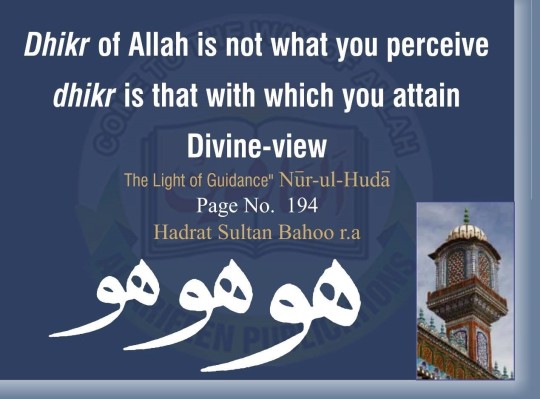
O, people! Verily We have created you from a male and a female, and have made you different branches and different tribes, so that you may recognize one another. Surely the most honored of you in the presence of Allah is he who is the most pious of you. Surely Allah is the All-Knowing, the All-Aware.
(Al-Hujurat: 13)
· And the sky! He it is Who has raised it high and set up the Balance (of justice)-
· That you may not transgress in the balance.
· And keep up the weight with justice, and fall not short in the measure.
(Al-Rehman: 7,8,9)
O you who believe! fear Allah and give up what yet remains due to you from interest, if you are true believers.
And if you do not do so, then take notice of the declaration of war from Allah and His Apostle; and if you repent, then yours shall be your principal sums. Wrong no other and be not wronged yourselves.
(Al-Baqarah: 278,279)
That is what Satan wants – to sow enmity and hatred among you by means of wine and gambling and keep you from the remembrance of Allah and from prayer. Are you not then going to desist?
(Al- Ma’idah: 91)

And whoso kills a believer intentionally, then his punishment is Hell; therein shall he abide forever, he shall incur the wrath of Allah and He will reject him from His mercy, and He has prepared for him a grievous torment. (Al-Nisa: 93)
And do not go near adultery, surely it is a great obscenity. And the evilest path. (Al-Isra: 32)
Hadith and Social views:
The vices, which Allah (SWT) has warned us against in Quran, are also indicated in Hadith. These vices cause social deterioration and disorder.
It was narrated that 'Ubaidullah bin Abi Bakr said:
"I heard Anas say: 'The Messenger of Allah [SAW] said: The major sins are: Associating others with Allah (Shirk), disobeying one's parents, killing a soul (murder) and speaking falsely.'“(Sunan an-Nasa'i)
Narrated Abdullah ibnAmribnal-'As: The Messenger of Allah (ﷺ) cursed the one who bribes and the one who takes a bribe. ( Sunan Abi Dawud )IbnMas'ud narrated:
"The Messenger of Allah (ﷺ) cursed the one who consumed Riba, and the one who changed it, those who witnessed it, and the one who recorded it." (Jami` at-Tirmidhi)
Narrated Abu Huraira:
The Prophet (ﷺ) said, "An adulterer, at the time he is committing illegal sexual intercourse, is not a believer; and a person, at the time of drinking an alcoholic drink is not a believer; and a thief, at the time of stealing, is not a believer." IbnShihab said: `Abdul Malik bin Abi Bakr bin `Abdur-Rahman bin Al- Harith bin Hisham told me that Abu Bakr used to narrate that narration to him on the authority of Abu Huraira. He used to add that Abu Bakr used to mention, besides the above cases, "And he who robs (takes illegally something by force) while the people are looking at him is not a believer at the time he is robbing (taking). (Sahih al-Bukhari)
Hadrat Sultan Bahoo’s (R.A) social views:
Sultan-ul-Arifeen Hadrat Sultan Bahoo (R.A) is ranked among those distinctive and illustrious mystics who, with a view to reforming the society, presented unique views which constitute the base of the human society in its essence. In the context of social relation, he (R.A) warns us not to develop relations with disloyal because an individual’s inherent disposition affects the whole society. For example, it is useless to advise a person who is churlish by nature. Any ameliorative sermon would fall flat on him. It will be like an act of casting pearl before swine. To share any epistemic item with such people is like a futile attempt of sweetening the bitter water. He (R.A) warns:
Hazrat Sultan Bahoo (R.A) says:
· Do not accompany treacherously and with slandering everyone you do not treat Hoo
· Even you take Bitter melon to Makah they can never become sweet Hoo
· Raven chicks can never become goose even if pearls you feed them to eat Hoo
· Bitter wells can never be sweetened ‘Bahoo’ even if you add tons of sugar to treat Hoo
Keeping this a particular point of his (R.A) ideology in view, a society expects its members, for its development, to be what is highlighted by such metaphors as sangi (a friend, chum), sweet-melon (an amicable person), goose (naïve or innocent), and sweet-wells (polite in manners).To make society a cradle of peace, its individuals should have the gentle demeanor, righteousness, self-confidence and humbleness. Man must possess the utmost civility. He should not utter any uncivilized or offensive remark. He must adhere to authenticity and truth in what he says. He should have the humbleness which will enable him to be magnanimous and discreet. Despite having carte blanche, he should have a lowly view about himself. Hadrat Sultan Bahoo (R.A) refers to such worthy ones as follows:
· Hundred thousand sacrifices upon those Sufis who don’t utter awful thing Hoo
· Thousands of thousand sacrifices upon those Sufis who only say one thing Hoo
· Billions of sacrifices upon those Sufis upon their ego they tread Hoo
· Trillion and trillions of sacrifices upon those Sufis who are pure gold but call themselves lead Hoo
#sultan bahoo urs#sultan bahoo darbar Spiritual#Tasawwuf#sufi islam#Al Arifeen Publications#Heart Deeper Than Ocean#rohaniyat o amliyat
0 notes
Text
Ennobling Power of Sultan Bahoo’s Poetry
Sultan Bahoo Sahib (1629-1691) is revered by unanimous consent, as a great Punjabi Sufi poet. This paper argues that his poetry is not only a pinnacle of Sufi wisdom, but it also enshrines antidote to the prevailing cynicism, uncertainty, pessimism, nihilism and consequent despair in the post-modern a society that has lost its religious and spiritual bearings.
Looking Around: An Angle on Our Times - A reductive view of Reality
Modernity has made an accelerated move away from the divine principles, the treasure of metaphysical and spiritual, non-human wisdom, which is perennial, because prior to all ages and therefore can never be lost (Nasr, 1999). Modernity has reduced the meaning of reality to the physical and material world alone, experienced by external senses and discursive reasoning. Science has no doubt, done great service to humankind, but its offshoots- naturalism, nominalism, and positivism- have generated ‘scientism’, the belief that there is no reality save revealed by science, and no truth except the one delivered by science (Wilber,1998). This empiricist epistemology pronounces the spiritual, ethical, aesthetic, emotional and poetic spheres and truths to be worthless or non-existent. Contemporary Western intellectual the thought makes a formal denial of what lies beyond human comprehension, for example, the idea of God and sacred (Guenon, 1999). Such a worldview reduces life to a skeleton without a soul, a shadow without substance.

Sultan Bahoo’s World View - Affirmation of God
On the other hand, Sultan Bahoo’s Sufi poetry rests on the certainty, the firm belief that there is no reality except one God, that is, Allah. Bahoo Sahib’s poetry springs from the love of Allah Almighty. He expresses divine Transcendence and Immanence in his vision of Oneness, when he echoes the Quranic verse “whosesoever ye turn, there is the face of God” (2:109). Wherever he turns his eyes, inside and outside, he sees Allah only. He does not see anything other than God. Therefore, his poetry does not give any description of physical objects. As his heart is emptied of everything other than God, likewise everything other than God is obliterated from his sight. This is expressive of the mystical experience of self-annihilation. His poetry is premised on the Quranic verse: “Everything perishes save God”. Allah is the only Absolute, Final Reality.
Sufi: Mirror of God
A Sufi is the most perfect expression of human nobility and dignity. A Sufi is not an ordinary person. He is a reflection of God and plants his feet on the seventh heaven. Sufis have been compared to precious gems like pearls and rubies. Sultan Bahoo compares ordinary people to earthenware and looks at Sufis as crystals (Bahoo, 2002:46). There is an unfathomable distance between the thought and imagination of ordinary poets and the thought and imagination of Sufi poets. As Maulana Rumi explains, “What is this talk of thought? There, all is pure light. The word thought is used for your sake, O Thinker, Saints belong to the realm where ‘all is pure light’” (1989, bk. 11:230)

Western Romantic Poetry
A Sufi’s consciousness and experience is different from the Romantic sensibility of Western poets. Western Romantic Poetry is a reaction to and protests against the positivist, insentient, impersonal world view. Shelley sees a larger Being pulsating in the universe, and voices the unifying vision in these words,
· “The light whose smile kindles the universe,
· The beauty in which all things work and move”
And Blake exclaims the idea of Oneness in these words, “To see a world in a grain of sand”
Likewise, Wordsworth expresses the idea of ‘One in all’ in the following words:
· A motion and a spirit, that impels
· All thinking things, all objects of thought
· And rolls through all things
However, the Nature-mysticism of Romantic poets has a “profane “character, because the idea of God or sacred does not inform their insights or experience (Zaehner, 1961). The feeling of Oneness, the unifying vision for a Romantic poet is not a vision of God. Romantic poets do not construe the One ground which contains within it all creaturely existence as God.
Moreover, they “physically see” nature - flowers, trees, hills, grass blades and creeks - with physical eyes and “hear” the murmuring rivers and singing birds with physical ears (Stace, 1961). They rely upon human imagination to transform the mundane into a heavenly world. According to their epistemic stance, human imagination is the source of truth and meaning.
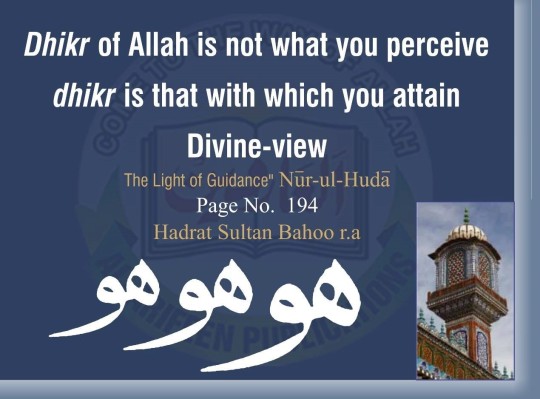
Sufi Epistemology: Heart as the source of knowledge
On the other hand, in Sufi epistemology, the heart is the source of knowledge. Sufism has been called “heart wakefulness”, and Sufis are known as “men of heart” (Lings, 1983). Sultan Bahoo Sahib, like all Sufi poets, sees with an ‘inner eye’, the eye of contemplation, and the spiritual knowledge is revealed to his heart. In Sufi hermeneutics, the term “heart” does not mean the bodily organ or seat of emotions; it is a supersensory organ to which the vision of God is revealed. Sultan Bahoo says that the heart is deeper than the deepest sea, and it houses all the universes.
Impersonal View of God
As the truth and reality of God cannot be empirically or rationally proved, His existence is denied by the dominant intellectual traditions of West. The result is a shuddering collapse of all that defines our humanity. The world ceases to be a comforting place, created and governed by the Creator, God, who cares for and loves His creatures. Modern Western poetry voices these crises of faith, the feeling of cosmic alienation, that is, either God is a fabrication of ‘infantile fantasy’, a relic of humanity’s childhood, or a remote, non-caring, blind, impersonal, mechanical force. The American poet Stephen Crane (1871-1900) expresses this impersonal, insentient view of God in these words,
A man said to the Universe
“Sir, I exist!”
“However”, replied the universe
“The fact has not created in me
A sense of obligation”
These lines show modern man’s isolation and the frightening the darkness of his spirit, because there is no comforting answer to cure his loneliness, as the dark, unknown forces remain unreachable. When, in times of despair and fear, we, as humans, look to higher powers for comfort and enlightenment, then we feel more isolated.

The Idea of God of Love
On the other hand, to Sultan Bahoo, God is more near to him than his own jugular vein (Bahoo, 2002:32). He believes in a God of love. The relationship between a Sufi and Allah is one of love. The Sufi path is a path of love (Chittick, 2000). The Sufi is a lover and Allah is the Divine Beloved, who inspires Sultan Bahoo Sahib, the lover of God into poetry; without His radiance, Sultan Bahoo cannot speak, because as Maulana Rumi says, “the mystic is like mount Sinnai, which echoes the voice of the Divine Beloved; or like David burning in the heart’s fire and producing lovely psalms”. Sufi poets often compare themselves to flute, since the flute can only talk when touched by the musician’s lip. They call for the Divine Friend’s breath or hand to enable them to sing. Sultan Bahoo Sahib says that lovers of Allah, who are drowned in the Sea of Unity, are the happiest people. They enjoy the felicity of living in an evergreen garden.
#Ain ul Faqr#Hadhrat Sultan Bahoo social views#Hadrat Sultan Bahoo’s period#Hadrat Sultan Bahoo's Persian Poetry#Bridal Symbolism in Sultan Bahu’s Poetry#Sufi poetry#Sultan Bahoo Poetry#Mystical Moments#Hadrat Sultan Bahoo (R.A.) Proposed Human Society#Sultan Haq Bahoo In This Modern Age#Role of Hazrat Sultan Bahoo
0 notes
Text
Effects of Materialism on Society and its Solution in the Teachings of Hazrat Sultan Bahoo (R.A)
Any object and an element of the universe which is observed by our physical senses is called material. Materialism means a tendency to consider material possessions and physical comforts as more important than spiritual values (Oxford Dictionary, 7th Edi).
Usually, we attach materialism with Dunia Dari and a materialist is called duniadar. When a person fully involves himself in Dunia Dari, he started getting away from Allah and loses his actual aim of life that is to recognize Almighty Allah. Individual aspiring materialism excessively often fell prey to physical imbalance as well as spiritual decline. An isolated individual becomes the very reason behind an isolated society.
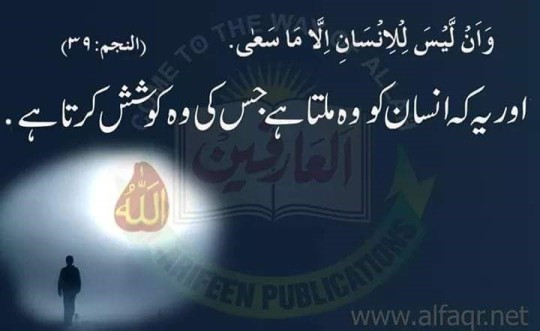
Materialism in the light of Holy Quran and Hadith
Allah Almighty warned against materialism. According to the Quran:
“O you, who have believed, let not your wealth and your children divert you from remembrance of ALLAH and whoever does that then those are the loser” (63:09).
“And this worldly life is not but diversion and amusement” (29:64).
“So let not the worldly lives delude you” (31:33).
According to the Holy Prophet (PBUH) we should always prefer a relationship with Almighty ALLAH to materialism as it is obvious from some quotes:
Hazrat Abu Hurairah said: “I heard the Messenger of Allah (SAWW) saying: “This world is cursed and what is in it is cursed, except the remembrance of Allah (dhikr) and what is conducive to that, or one who has the knowledge or who acquires knowledge” (Tarimzi, Ibn e Maja, Mishkat Sharif).
"Do not take to the estate, such that you become desirous of the world" (Jami` at-Tirmidhi).
“Love of the mundane world is the root cause of all evils” (Mishkat Sharif).
It was narrated that Sahl bin Sa’d said, “We were accompanying Messenger of Allah in Dhul-Hulaifah, when we saw a dead sheep lifting its leg (because of bloating). He said: ‘Don’t you think this is worthless to its owner? By God in Whose hand is my soul, this world is more worthless to Allah than this (dead sheep) is to its owner. If this world was worth the wing of a mosquito to Allah, the disbeliever would not have a drop to drink from it” (Tarimzi, Masnad e Ahmad).
Jabir b. Abdullah reported that Allah's Apostle (SAWW) happened to walk through the bazar coming from the side of 'Aliya and the people were on both his sides. There he found a dead lamb with very short ears. He took hold of his ear and said: “Who amongst you would like to have this for a dirham? They said: We do not like to have it even for less than that as it is of no use to us. He said: Do you wish to have it free of cost? They said: By Allah, even if it were alive (we would not have liked to possess that), for there is a defect in it as its ear is very short and, now it is dead also. Thereupon, Allah's Messenger (SAWW) said: By Allah, this world is more insignificant in front of Allah than it (this dead lamb) is in your opinion” (Sahi Muslim, Mishkat Sharif).
Mustawrid bin Shaddad said: “I was riding with the Messenger of Allah (SAWW) when he came across a dead lamb that had been thrown out’. He said, “Don’t you think that this is worthless to its owners”? It was said: ‘O Messenger of Allah (SAWW), it is because it is worthless that they have thrown it out, - or words to that effect. He said: ‘By the One in Whose Hand is my soul, this world is more worthless to Allah than this is to its owners’ (Sahi Muslim, Mishkat).

Materialism according to the teaching of Hazrat Sultan Bahoo (R.A)
Many Sufis talked about the materialistic world, but Sultan Bahoo (R.A) not only discussed materialistic world but also highlighted the greediness, fray, etc. Sultan Bahoo (R.A) was not against wealth rather, Sultan Bahoo urges people to acquire wealth for the right cause (Faheem, 2011). As he says:
· Half the curse upon the world and a full curse upon mundane Hoo
· Those who have not spent on the path of Almighty, enraged punishment they will Obtain Hoo
· It makes fathers slaughter sons, damn your o worldly ploy Hoo
· Those who have abandoned the world ‘Bahoo’ spring gardens pleasure they will Enjoy Hoo
Sultan Bahoo (R.A) not only negated but also hated worldly desires. He condemned the only love for World. He said that loving the world is synonymous to greed for material possessions and abandoning worldly desires means loving Allah and nurturing one’s spiritual values. Materialistic worries cause depression, stress, and anxiety as well as faded away from the love of Almighty Allah.
· This materialism is unclean like woman menstrual and never purified same Hoo
· In the house of Faqeer where is worldly wealth his life is dam Hoo
· World love turns away from Allah with unnecessary worry and tension Hoo
· Divorce worldly wealth three times ‘Bahoo’ if truths to mention Hoo
#Sultan ul Faqr#Sultan ul Arifeen#Sufism#Hazrat Sultan Bahoo#Teachings of Hazrat Sultan Bahoo#asrar-ul-qadri#shams-ul-aarifeen
0 notes
Text
Conspiracy of Clash of Civilizations and Teachings of Hadrat Sultan Bahoo
A lot has been written about clash of civilizations especially over the last 3 decades and mostly by prominent academics and intellectuals. We will enlighten this topic with teachings of Hadrat Sultan Bahoo. Portraying it more as a prediction rather than a reconciliation manual. The ironic thing is that when analyzed in detail and scrutinized on facts and figures, it becomes very obvious that the factual basis is very thin for a clash between civilizations to happen naturally, as it is being shown that it is a natural happening phenomenon. the most prominent among those writers who wrote about the clash of civilizations is Samuel Huntington and Bernard Lewis.
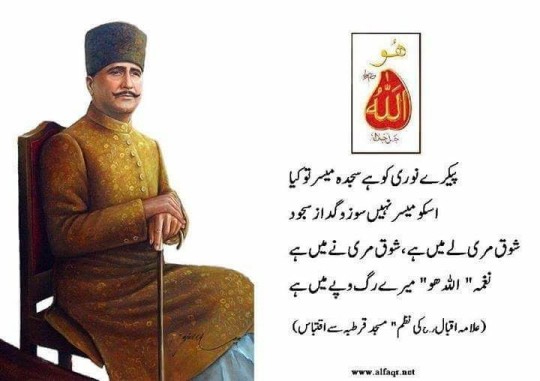
If someone would have informed me that those books are written by post-cold war generals and policymakers, who went out of a job after the cold war finished, I would have easily believed so. Because both the writers have painted it with biased and prejudice colors. The main purpose was to keep the western mainstream public ‘s mentality in a constant state of war. Namely that the cold war is finished but we have a bigger clash awaiting us hence to justify the oppression. Samuel Huntington’s essay about the clash of civilizations first time appeared in the journal of foreign affairs in 1993 and later on developed into a book. The publication of this essay in the journal of foreign affairs is evident enough about t its importance to the policymakers. According to these writings, the most primary conflict would be between western and nonwestern civilizations, i.e. Islamic and Confucian. Towards the end of Huntington’s book, he offered a solution that what the west must do to keep other civilizations weak and keep their dominance over them, the following is from his book.
The west must exploit differences and conflicts among Confucian and Islamic states to support civilization and groups sympathetic to western values and interests, to strengthen international institutions that reflect and legitimate western interests and values, and to promote the involvement of non-western states in those institutions.
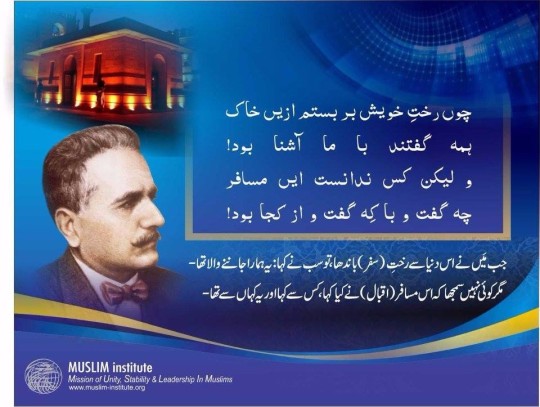
Now after reading the above quote from his book even a person who is not academic or aware of global politics can easily determine that it's very aggressive and interventionist attitude towards other civilizations make them more western or mere copies of one's image. Western civilization is the central point in all those books and essays and portraying as if all other civilizations are in direct conflict with the west. the obvious reasons are off course left out from these writing which is the illegal occupation of lands to control the resources. The topic chosen for these writings is very misleading and deceptive showing the greed for power and resources as the phenomenon of clash of civilizations. Leaving out the core reasons for these clashes are evident enough to show that these books and essays are written for artificially engineering this clash for the dominance of the west and suggestions are not there to reconcile or resolve anything either.
These writings are just an extension of painting other civilizations especially Islam in white and black and solidifying the already negative image into a more sinister one to keep the artificially engineered pessimistic state of the mind of the west alive to add fuel to the fire. The ethnic cleansing in Bosnia and the Spanish inquisition which were the acts of hate towards other people cannot be portrayed as a clash between civilizations as suggested in these writings. The definition of clash of civilization is being mingled and twisted in a way in these writings that any person with limited knowledge of history would be so confused and full of rage towards other cultures as to confront them. Surely teachings of Hadrat Sultan Bahoo can help us in this regard.
#Sultan Bahoo Books#Sultan bahoo history#Sultan Bahoo Parents#Nur-ul-huda#Kalid-ut-tawhid#aql-e-baidar#mahak-ul-faqr
0 notes
Text
Transforming Message: From the Teachings of Hazrat Sakhi Sultan Bahoo (R.A)
Often I come across people, saying country is going to total destruction, the system is bad, things are getting worse, society has lost its norms, public institutions are corrupt, no discipline, no work ethics, nepotism, no integrity and look at west – Europe or the US where people are committed to working, there is a system, there is a discipline. I being from one of the working-class and a few years of living experience in Europe also feel much difference and above all the difference between words and acts. In harsh words, we call it hypocrisy – the major weakness. What we preach we don’t act upon, what we say from our mouth, we don’t mean it from our heart.
Once in a workshop on one of the management disciplines, one of my colleagues inquired from the presenter Sir, “west is full of evils/sins and crimes, even then it is developed/ disciplined with welfare societies and systems properly functioning and we Muslims are suffering. Our lecturer answered: very simple! We are liars and liars are cursed by Allah. (jhooray par Allah laanat bhaijta hey)
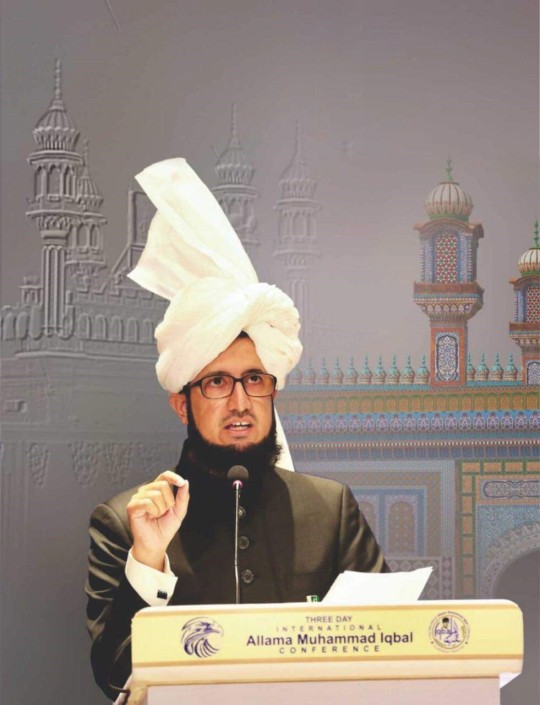
Reason for downfall:
A lot of discussions are held, talk shows are presented, still, no positive outcome to curb our downfall. When we analyze our problems, one may find out that reason for our failure, our moral/social/religious and national decline, and disrespect is our unbalanced life i.e. our inner self is not harmonizing with our outer self. Life can become balanced with positive inner self and positive outer self. This leads to the fact that there are two aspects of life: one is outer i.e. our body and other is the inner self that is our soul.
Cure:
Everything is curable except death and even death can be delayed for a while through prayer (dua with a true heart)
* Physicians cure bodily diseases but what about inner-self that suffers from negative thinking/jealousy/hatred/deceit and hypocrisy?
* Is there any physician for the healing of inner self? Is there any teacher or a mentor to guide for grooming inner self like a university or school teacher that guides a student for worldly education?
*Is there any instrument that cleanses the heart and makes it shine with purity- the only purity- the love of the Creator – the Omni-potent.
The answer to the above queries is YES and this we find in the teachings of Hazrat Sakhi Sultan Bahoo ( R.A), Sultan-ul-Faqr the 5th and the great Sufi Saint, not just a Sufi poet.
Allah has provided Spiritual mentors to heal inner self. And yes there is an instrument that can remove the rust/evils upon our heart and make it shine with the purity of true love- the love of Allah.
The concept of a mentor must be new in the Science of management but it is not new in Islam. The Spirtual Mentor– (Murshid) In the school of Sufism, Spiritual Mentor is a true slave / true follower of our Beloved Prophet Mohammad (PBUH).
Spiritual mentors are guides to purify our inner self and balance our lives to come out of hypocrisy and achieve the purpose of life which is very clear by this Hadith-e- Qudsi:
Allah Says! “When I wished to be recognized, I created Human being to recognize me”. So the purpose of all of us is to know Allah, to recognize Allah, to witness (as per Kalima) that there is only one God and witness is accepted from the one who has seen (just like an ordinary case in the court where judge accept a witness who has seen the happening). Have we seen Allah? can we see Him? The answer is given only by Spiritual mentors and under present days – the teachings of Hazrat Sultan Bahoo have become prominent on account of hectic efforts from the international organization for Unification of Muslim Umma “AL- Arifeen” under the visionary and benevolent Command of Hazrat Sultan Mohammad Ali from the Blessed Shrine (Darbar pak) of Hazrat Sultan Bahoo (R.A).

In today’s complex life, ordinary people are suffering on account of sectarianism, extremism in the name of religion, an educated section of our society avoid any such program that has to do something with the religion. Exploitation in the name of Islam has made people distracted from the real message of Islam as per the Quran and Sunnah and this distraction led to moral degradation. The teachings of Hazrat Sultan Bahoo (R.A) are strictly in line with the Quran and Sunnah. In fact, for the practical implementation of Sunnah, his teachings are like stars in the darkness that guides the seeker towards the right path to reach the destination.
The core message of Hazrat Sultan Bahoo is reaching the heights of humanity through revolution and this revolution is not riot or insurgency instead its transformation of heart towards peace and eternal love for the Creator and His Beloved Prophet Mohammad PBUH. Once our heart gets purified and enlighten with the pure love of Allah then negativity comes to an end and truth prevails. Under the present state of affairs when Islam is being tarnished with slogans of extremism and terrorism, this strong revolutionary message of Hazrat Sultan Bahoo (R.A) reveals the real Islam that is meant for all human beings and especially for today’s generation that really wants direction for a purposeful and successful life, his message is a key to success and ultimately survival.
#shams-ul-aarifeen#asrar-ul-qadri#Teachings of Hazrat Sultan Bahoo#Hazrat Sultan Bahoo#Sultan ul Arifeen#Sultan ul Faqr Hazrat Sultan Bahoo
0 notes
Text
The Manifestation and Exuberance’s of Sultan Haq Bahoo in This Modern Age
The Mughals in India embellished and decorated as pioneers of architectural designs with glorious gardens of this Happy Hindustan and land of splendors, which even surpassed Greco- Roman Civilizations. The first illumination of Deen Al Islam was brought by Muhammad Bin Qasim, a young youthful General from Arabia, who taught an everlasting lesson to Hindu civilizational philosophy; Later on Deen Al Islam effective guidance reached through Iran to Afghanistan to India. There is a (tradition) mentioned by Prophet (SAW) a cool Breeze is coming to me from this lush green land of crops with abundant water, which means Quran Qareem Revelations and Seera. Sunna will progress for the welfare of Muslims in the Light of Deen Al Islam. This will satiate the misguided people form the thirst of human integrity and dignity through a perfect path. The glory was further brightened by the deep devotion of Islamic institutional ideologues (Mubellighen) who established the prevalence of Deen which became blessings for the misguided mankind. It is impossible to deny the role of the Hajweri, Moinuddin Chishti and Sultan Bahu (RTA), who were preponderant in their respective regions and made enormous contributions in converting non-believers (Hindus – Buddhist) to the straight path as revealed by Allah (SWT) in the Quran and Sunnah of Prophet (SAW). This is also an undeniable fact that Mughals further promoted the supremacy of the Quran.

Sunnah through their regime with unforeseen interruption, but this fabric remained intact for more than two thousand years. These Mujahideen and their followers further erected Buildings, Mausoleums Madrassas, and schools with institutional propagation of the Quran of Allah (SWT) and Sharia of Prophet (SAW). This enlightenment was further consolidated in which “ Tauheed ” ( Oneness of Allah (SWT) manifestation emerged in the light of Holy Prophet (SAW)). Quran Qareem clarified the Mission and Message to mankind in the following Revelation; -
(41:53) “Soon will We show them Our Signs in the furthest regions of the Earth and in their own Souls, until it becomes manifest to them, that this is the Truth, is it not enough that your Lord does witness all things”.
The remarkability of Deen extensive intensive spread from Arabia to the hearts and souls of the people was a constant miracle done by the companions (RTA) and their patriotic placement of spirit was further ingrained by the future generations of the Friends of Allah (SWT). These leaders in their respective lands proved to be the arbiters of the World fate and proved the universality of Deen Al Islam. The noble and heroic deeds of these companions resounded throughout this World. This can be stated as it makes no difference; whatever may be propounded or done, the Deen of Allah (SWT) Truth must prevail and He knows who cause an obstruction and who sacrifices to help.
British Bayonet promulgation brought so many conspiracies with constant contradictions which orchestrated the shrewd policies of imperialistic armies who made local populations as their beneficiaries with gold – silver awards rewards to change the entire structure and function of Islamic ideology. These unbelievers tried their utmost to debase Sharia system unsuccessfully, but they did change the peoples' intention by seducing them too materialistic gains. These hundreds of years’ struggle did not make Indians to be subjugated by colonialist powers, so there was a revolt which was the preface of Hindu- Muslims emancipation. The emergence of Pakistan was a clear cut proof of that “Dawa” work or reformation was in progress by many mass movements to get rid of shackles of Foreign forces. It was always the Masajids and Madrassas movements by calling “Azan:” for prayers, kept the everlasting shine of Deen Al Islam. The International movement for decolonization became imperative because imperialism was suffering heavy losses of life and limb.
The colonial age lost their possessions but the onslaught of western culture continued its work, in the form of westernized institutions of despotic democratic designs of civilian bureaucratic with feudal legislature supported by Judicial policies with law enforcement agencies. The brilliantly trained graduates from western universities imbibed with new concepts proved to be excellent representatives for our learning Institutions. They were heavily funded by Scholarships and Training Courses to mold the minds of our Intelligentsia in their socio-economic materialistic doctrines. The application of these indoctrinations worked so magically that the schematic results were very encouraging for both beneficiaries. The new crop of secular socialist scholars influenced the polluted politicians, who danced on the tunes of their Masters. Muslims suffered from Ideological crises and their validated values disturbed the fabric of Ummah‘s state-society systems.

The real decline of Muslims communities happened when post modernization storming invasion was accepted and impression became a reality of modern age. The explosion of mass communications computer sciences in the form of internet, web site, control of space program which means the supremacy of air-sea and Earth as satellites to have internal information in depth of our dimensional perception. These novel revolutions made us indulge in slavish imitation of technological progress. The intermigration which improved the lives of our folks gave a significant edge to our hidden enemies. The change of life perceptions gave us sensations of establishing our priorities to prefer worldly ways and brought our “Deen” as a secondary priority if necessary. The insecurity developed to such an extent that the normal thought process gave immense importance for materialistic means to improve our world, while other domains have yet to be explored. It was unfortunate that lack of planning brought a financial crisis and injustices in socio-economic sectors and further funding by foreigners made us lose our self-respect and determination to find solutions to resolve our financial critical crunches. The modern age materialistic, capitalistic socialistic systems developed attractive webs to have a better life standard but at the cost of consumerism, commuting modes which made modern societies were individualistic to the level of selfishness while entering a stressful competition of a rat race. This Brave New World order alleges freedom of choices with limited human rights progressed into a global village. A doctrine of unified democratic designs to bring health, happiness, and progress to make life a dynamic identity in the ever-changing social environment. These drastic attractive changes not only convinced our convictions but completely captivated our souls and we became unicorns of this world, with least idea of “afterlife”.
#Sarwari qadri order#Mahnama Mirrat ul Arifeen international#Hazrat Sultan Muhammad Asghar Ali#sultan bahoo horses#sultan bahu karamat#sultan bahoo picture
0 notes
Text
Spiritual Caliphs
Spiritual Caliphs are those desirous of Allah who have been through spiritual assessments and they were found to be sincere with Allah Almighty and hence they have been granted permission as well as powers to promote the spiritual influence of Ism-Allah-Zat (the only spiritual ritual in Sarwari-Qadri Sufi Order) and guide the desirous of Allah towards Allah.

Syed Ahmad Shah and Syed Mahmoud Shah
Both brothers were disciples and spiritual beneficiaries of Hadrat Sultan Bahoo R.A. They were soldiers in Aurangzeb Alamgir’s army. Their combined mausoleum called “Darbar e Badshahan” (Palace of King) is in Khushab.
Shaikh Junaid Qureshi
He was a resident of Sardarpur, Multan. He met Hadrat Sultan Bahoo R.A. beside river Ravi where he took Spiritual Oath.
Sultan Hameed Bhakri
He took Spiritual Oath and was blessed with vicegerency directly from Hadrat Sultan Bahoo R.A. Once a Majzoob (absorbed) tried slapping him, Hadrat Sultan Bahoo R.A. stopped the Majzoob by holding his hand.
Khalifa Noorang Khatraan
He took Spiritual Oath on Blessed hands of Hadrat Sultan Bahoo R.A. and was blessed with vicegerency. He passed away in 1066 H. One of his sons Sultan Allah Dad is buried in D I Khan. Sutho Sultan was his renowned son.

Khalifa Mullah Muali
He was from Dhadar, a place near Qandahar. He gained vicegerency from Hadrat Sultan Bahoo R.A. His mausoleum is in Sibbi and his descendants are called Khound.
Mullah Misri
He arrived at the blessed court of Hadrat Sultan Bahoo R.A. in the company of Mullah Muali to attain spiritual blessings. His mausoleum is in Dhadar (Baluchistan).
Alam Shah
He also arrived at the blessed court of Hadrat Sultan Bahoo R.A. in the company of Mullah Muali. His mausoleum is in Qandahar.
Syed Momin Shah Gilani
He was from Ghotki, Sindh and arrived at the blessed court of Hadrat Sultan Bahoo R.A. in the company of a potter. Hadrat Sultan Bahoo R.A. returned Momin Shah to gain knowledge of Jurisprudence; he later took oath from Hadrat Sultan Bahoo’s elder son Sultan Noor Muhammad R.A.
Shaikh Kaloo
He was the son of Shaikh Junaid and lived in Multan (Sardarpur). He was a disciple of Hadrat Sultan Bahoo R.A. His mausoleum is in Sardarpur.
Fatima Mastouen
When she was crying in her cradle as a toddler, Hadrat Sultan Bahoo R.A. picked her, inscribed Ism-e-ALLAH on her heart and elevated her to the status of Waliah. Her mausoleum is in Wahowa, D I Khan.
Son of Faeroz Silachi
Faeroz came to Punjab in the company of Mir Chakar Khan Rind Balouch, from Baluchistan, and attained spiritual blessings from Hadrat Sultan Bahoo R.A. His mausoleum is in Satgarah.
#sultan bahoo urs#sultan bahoo darbar Spiritual#Tasawwuf#Heart Deeper Than Ocean#Al Arifeen Publications#rohaniyat o amliyat#sufi islam
0 notes
Text
Role of Hazrat Sultan Bahoo in the Unity of Muslim Ummah
There will not any Prophet after Muhammad(PBUH), and the duty of showing humanity the light to the right path is now carried out by His caliphs and Sufis of Islam in this world. History of Islam is full of examples where His caliphs and Sufis have spent their whole life like a lighthouse guiding His creature towards the path to eternal success. Among them, the name of Hadrat Sultan Bahoo is shining like a moon in stars. Hadrat Sultan Bahoo in his poetry has invited and guided those who had lost their path, to Creator and gathered them upon the real driving force behind the universe, in his poetry, there is a clear message to be united around the real power in the universe and be a Muslim nation in true spirit. Most of his poetry is to strengthen our connection with Him.
Is now quoted as a symbol of our faith in Allah and is recited in religious gathering to strengthen our connection with Him. Many non-believers have turned to believers after listening to the poetry of Hadrat Sultan Bahoo, and this chain will continue until the Day of judgment.
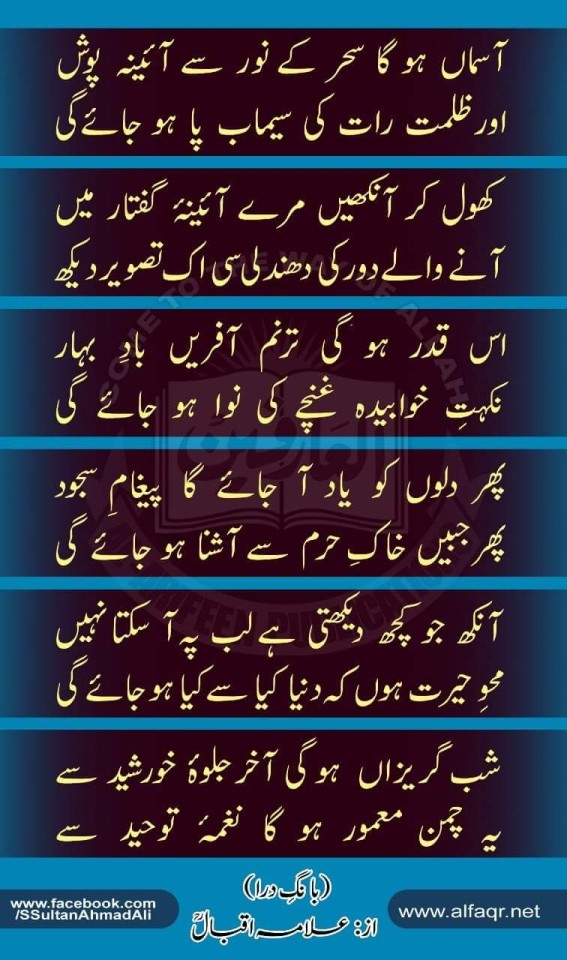
Name and work of Hadrat Sultan Bahoo will ever remain glowing in the darkness of the time and will continue showing the path to those who are willing to and are eager to see Allah on the day of judgment. Hadrat Sultan Bahoo will ever remain a great channel between man and Allah. Those who are followers of Bahoo are actually the followers of the truth to the straight path to Allah.
We are lucky in the sense that we are living in the era of Hadrat Sultan Muhammad Ali and Hadrat Sultan Ahmad Ali who have received the light of the truth from Sultan Bahoo through Sultan Asgher Ali and have reached a high position in showing the path to the truth to those who had lost their path and are searching for the real message of Allah. The light ignited by Hadrat Sultan Bahoo is showing upon His creatures through the Sultan's of the time who are perfectly doing the duty their ancestors have bestowed upon them in this hard time on the Muslim Ummah.
#Ain ul Faqr#Hadhrat Sultan Bahoo social views#Hadrat Sultan Bahoo’s period#Hadrat Sultan Bahoo's Persian Poetry#Bridal Symbolism in Sultan Bahu’s Poetry#Sufi poetry and Sultan Bahoo Poetry#Mystical Moments#Hadrat Sultan Bahoo (R.A.) Proposed Human Society#Sultan Haq Bahoo In This Modern Age#Role of Hazrat Sultan Bahoo
0 notes
Text
Intellectual Meanings (Dimensions) of ‘Unity of Being Philosophy’ in Hadrat Sultan Bahoo's Persian Poetry
Hadrat Sultan Bahoo (RA) was a man of enormous mysticism and certainty. His spiritual experience is aromatic. What is his poetry? His poetry is spellbinder of spiritual treasures. It is so full of manifestations and observations that its interpretation is very obvious for its spiritual and intellectual reality. This kind of commentary and interpretation is a clear expression of his aesthetics and conscionable feelings. The manifestations of oneness are often revealed in the mirror of exuberance, because of the phenomenon of absolute existence. This is a beautiful phantom of mystic experience and revelation.
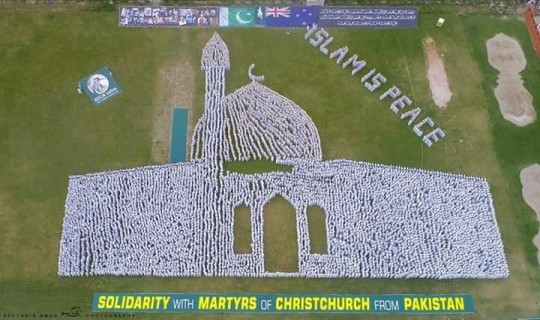
From many centuries, Persian poetry has a fragrance of this experience and its expression is so colorful and diverse. Sannai, Attar, Rumi, Sadi, Ameer Khusro and Hafiz’s poetry ‘scenario of love’; these all poets give the true vision of waḥdat al-wujūd (unity of being) aesthetics. The creation of this article manifests itself from oneness, which is the foundation of this fantasy.
These powerful thoughts lit up the creative horizons of poetry. The multicolor cultures of poetry and homogeneity of religious cultures form a visionary system, which preview all colors of oneness. This journey never stops and can never be stopped. Because its expression is practical and poetry gives emotions to this expression and appears on the face of spirituality. The vision and aesthetics of this poetry travels for centuries and reaches Sultan Bahoo (RA) and his spiritual experience makes it the mesmerizing effect, which reflects the fusion of concept and dream. The trueness of his creative experience kindles Gnostics and mysticism in the poetry. His poetry’s moral system exists on spiritual sensations. The experience of unity of affecting the creative the environment in such a way that all these colorful scenes are expressed from the manifestation of obligatory existence. If you look at the first poem of his poetry collection, how beautifully the spiritual sensation turns into the perception of oneness. He highlights the spiritual aesthetics in the intellectual context of absolute existence.
· I am certain within the universe there none worthy of worship besides Hoo
· There is no existence or objective in both worlds besides Hoo
· In hand with the sword of negation come alone without grief of hesitation
· Depending on acquaintance other than the truth is no triumph besides Hoo
· Negate all besides Allah and seek Allah from Allah
· Keep your sight toward unison there is no purpose besides Hoo
· He is first He is last manifests His splendor
· Actual Divinity manifests from the truth there is none besides Hoo
· He is Hoo He is truth I know none other than Hoo
· He is Hoo He is truth I don’t recite none other than Hoo
· Listen o friend of passion there is no trinity or duality
· He is One He is the purpose none exists beside Hoo
· I mention one I search one and one I keep in my heart like a flower
· That one I find one besides that I find none other
· I traversed entire universe I only liked that Truth (Haq)
· I called out one seen one and seen none other than one
· I am consoler of myself nothing is in my hand besides Yahoo
· I have attached my heart and soul with Hoo and not attached with none other besides Hoo
This poetry is interpreting the mystic creativeness of Hadrat Sultan Bahoo (RA). This poetry is unfolding the certainty of his spiritual vision. The true sensation of sound aesthetics reflects his internal experiences and observations. This poem is written on the experience of unity of being, it reflects his mysticism, conscience, knowledge and focus. He has mounted on this spiritual experience and this is the musky tenderness of his concept. The trueness of his experience is spread all over the poem; it’s like the fragrance of blossom or the lyrics of diverse colors or the scattering fragrance of negation and affirmation in the jasmine sapling or the munificence of perfect master. All these various colors adapt the model of oneness and give a new context to aesthetics, that’s why this poetry takes the true spirit of unity of being and it
extends the visionary thoughts. Oneness becomes so prominent in its aesthetics that; its manifestations are revealed from the curtains of exuberance. In the tidal wave of emotions, it deviates from the techniques of poetry. Sometimes the rhymes are missing and it loses its track as well. It seems diverting from the general poetry rules. Missing rhymes does not dilute its richness and melody, but often this technical freeness reflects the aesthetics of poetry in a paranormal and unique way. These technical shortcomings don’t take away the original concept of poetry and keep them revolving around the spiritual sphere. Absolute existence of oneness is the witness of aesthetics. The adaption of immense emotions provides new and precious experiences. Have a look at some of his poetry, which has obligatory and absolute spiritual aesthetics.…… The temporary and possible context of ‘me’ scatters a delicate fragrance.

· Thousand-time remorse that there are thousand forms of arrogance
· In the same remorse I sigh hundred thousand of time
· Sadly, I am unaware of how to take this arrogance out forever
· When will you get me relief from it remorse thousands of times?
· Alas where is Divine law (sharia)? of spiritual path I am neglectful
· And I am unaware of this reality thousand times regretful
· I have seen what I have seen and eaten what I have eaten
· Within my chest is lounging scar thousand times regretful
· Where is my beloved? That old consoler where is he
· In his separation in sorrow you call him friend again and again.
#Sultan ul Faqr#Sufism#Sultan ul Arifeen#Hazrat Sultan Bahoo#Teachings of Hazrat Sultan Bahoo#asrar-ul-qadri#shams-ul-aarifeen
0 notes
Text
How do the Teachings of Sultan Bahoo Contribute to the Achievement of a Spiritual Democracy as Espoused in the Philosophy of Allama Iqbal?
Iqbal deals with the idea of Islam as a social movement for the basis of a structure of State and social society in his sixth lecture in ‘The Reconstruction of Religious Thought in Islam’ titled ‘The Principle of Movement in the Structure of Islam’. In order to understand fully this structure that Islam aims to create, it is pertinent to first understand how Iqbal views Islam as a movement in its essential nature. And what problems have been faced by Muslims in the past in being unable to achieve that with a view to those elements which would fulfill the said deficiencies. It is also important to bear in mind the fact that Iqbal does not wish to present an alternate view of Islam but only what he recognizes as the practical manifestation of the true spirit of the Quran.
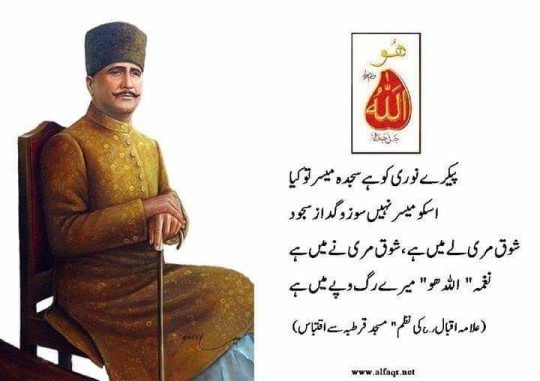
To begin with, Iqbal defines the cultural movement of Islam as ‘an emotional system of unification’. Emotional here does not mean erratic and sentimental but signifies its classification as a system which deals primarily with the control of or access to deeper human faculties of cognition and comprehension beyond the physical senses. For Iqbal and Sultan Bahoo as we shall later see, the nexus of reason and emotion is a complementary pair not meant to be opposites challenging one another. This system is unifying by virtue of its recognition of the centrality of the Human Individual as its mode. This, in turn, relies upon a ‘perception that all human life is spiritual in its origin’. This is the conceptual phase of Iqbal’s ideology.
These two elements are central to the spiritual concept of the Quran and the teachings of Sultan Bahoo (RA). As for the Human Individual, the holy Prophet declared:
خلق اللہ آدم علی صورتہ
Allah created Adam in His own Image
Sultan Bahoo adds to this by declaring, “Adam (AS) is Human. He who reaches the stature of Adam (AS) is Human. If someone asks if the children of Adam are capable of reaching his stature then it is possible as per the verse: [5]
لقد کرمنا بنی آدم
And we have also honored the children of Adam”
The second element deals with the understanding that all human life is spiritual in its origin. Sultan Bahoo’s explanation of the origin of Humanity in the World of the Spirit (Aalim-e-Lahoot) explains in detail how all souls were once in union before Allah, as the Quran reminds:
الست بربکم؟ قالو بلا شھدنا
Am I not your Lord? Verily, we testify!
This conception of the Human Self as the reflection of Allah is central to the understanding of the place of an individual in Islam and Sultan Bahoo guides his followers towards this very purpose i.e. the actualization of the Human potential of perfection which is based upon the common spiritual origin of mankind. This is the concept upon which, as per Iqbal, Islam’s notion of unification entirely depends. As the Prophet (PBUH) said:
من علف نفسہ فقد عرف ربہ
He who recognizes his Self recognizes his Lord.
After having established the concept of Islam and its essential features, Iqbal goes on to analyze how to establish a living factor of this principle of the emotional and intellectual life of mankind. He identifies the principle of Tauhid (oneness) as the practical means of achieving this. Tauhid demands loyalty to Allah above all else. And because Allah is Himself the spiritual basis of all life, loyalty to Him amounts to Man’s loyalty to his own ideal, actualized nature.

The teachings of Sultan Bahoo reveal the demands of Tauhid. It is a negation of everything but Allah whether in an understanding of existence, purpose, aim or desire. Throughout his writings, he repeatedly makes reference to the phrase:اللہ بس ما سوی اللہ ھوس
On a plane of concept and belief, this is an expression of the idea of wahdat ul wajood, the unity of existence but in reference to Tauhid as a matter of practice, it establishes the concept of Wahdat ul Maqsood or the unity of purpose. Sultan Bahoo explains that Humans fulfill their purpose only when their aim or desire, Talab طلب is of Allah. He regards all strife and pursuit of the pleasures of this world and the next, besides the desire to find Allah, to be vain. It must be established here that this is not a call to asceticism. He clarifies in his book Ainu ul Faqr that the Human self is like a boat floating on the waters of the world. That is how it is to travel but to never allow the water to enter the boat itself. This is the achievement in the practice of Tauhid as Iqbal sees it for the foundation of ‘world unity’.
Iqbal also states that the expression of the spiritual basis of life reveals itself in variety and change. The mobility of these ultimate principles is achieved through Ijtihad an important source of Islamic law. Before considering what this Ijtihad consists of, it is important to see why Iqbal believes that the Muslim world has suffered ‘the Immobility of Islam in the past 500 years’. His first identification is the conflict that arose with a misunderstanding of Rationalism after the theological schisms of the Abbasid era. This led to the opposition to Rationalism to preserve the social integrity of Islam through making the structure of the legal system of the Sharia as rigorous as possible. Iqbal sympathizes that this misunderstanding caused the need at the time for doing so but does not present an alternate recourse to how this balance with Rationalism ought to be achieved.
#Sultan Bahoo Books#Sultan bahoo history#Sultan Bahoo Parents#Nur-ul-huda#Kalid-ut-tawhid#aql-e-baidar#mahak-ul-faqr
0 notes